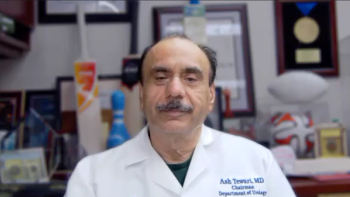
Might DHA Enhance Regorafenib’s Antitumor Effects in Kidney Cancer?
The fatty acid DHA, a component of fish oil, might enhance regorafenib’s ability to slow angiogenesis and tumor growth in renal cell carcinoma.
The fatty acid docosahexaenoic acid (DHA), a component of fish oil, might enhance regorafenib’s (Stivarga) ability to slow angiogenesis and tumor growth in renal cell carcinoma (RCC), suggest findings from a preclinical experiment with cancer cell lines and mouse xenograft models. The study was
In a mouse xenograft model of human RCC, the combination was associated with greater reductions in tumor weights than either agent alone, the research team reported. Those findings were supported in RCC cell lines which “showed similar results in vitro,” they noted.
The study might represent a path toward a new strategy for delaying the development of tumor drug resistance, the researchers suggested.
“Most renal cell carcinomas learn to escape therapy after a couple of years,” said study coauthor Robert Weiss, MD, professor of medicine at UC Davis, and head of the kidney cancer working group at the UC Davis Comprehensive Cancer Center in Sacramento, Calif., in a
Regorafenib is a multikinase inhibitor. The DHA metabolite epoxydocosapentaenoic acid (EDP) might inhibit tumor angiogenesis, previous research has shown-but the soluble epoxide hydrolase (sEH) enzyme degrades EDP. The researchers hypothesized that adding DHA to regorafenib therapy may enhance and prolong regorafenib’s antitumor effects.
“We knew that regorafenib blocks sEH,” Weiss was quoted as saying in a press release. “If you add more DHA and block sEH, all that DHA goes toward creating EDP, which contributes to the anticancer effect.”
It is not yet clear that this hypothesized mechanism explains the team’s findings, or that the combination will delay drug resistance. But the researchers confirmed that regorafenib plus DHA in both RCC cell lines and in transgenic mouse tumors, indeed kills RCC cells, inhibiting tumor angiogenesis biomarker production, and slowing tumor growth. Mice fed a DHA-enriched diet experienced increased plasma levels of all CYP450 DHA metabolites, they noted.
“Because DHA is the predominant component of fish oil, our data suggest that this nontoxic dietary supplement could be administered with regorafenib during therapy for advanced RCC and could be the basis of a clinical trial,” the coauthors wrote.
The research was funded by the US National Institutes of Health, US Department of Veterans Affairs, and Dialysis Clinics, Inc.
Newsletter
Stay up to date on recent advances in the multidisciplinary approach to cancer.






































